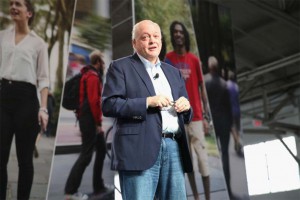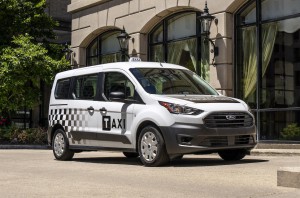A deal between Ford and Volkswagen focusing on joint efforts in the light commercial vehicle market could come together quickly, but in his first official acknowledgement that the two carmakers are exploring a wide range of additional options, Ford CEO Jim Hackett said those negotiations involve a “delicate dance.”
Like a growing number of competitors, Ford has opened up to the possibility of teaming up with erstwhile rivals on a variety of projects. And, in recent weeks, sources have indicated it is discussing deals that also could see them team up on everything from autonomous and electrified vehicles to joint production and marketing efforts in markets such as Europe and Latin America.
“(VW CEO) Herbert (Diess) and I had a great discussion” about a possible alliance on commercial trucks, Hackett said in an interview with the Reuters news service, noting that things are “going better than we thought it would.”
But, Hackett cautioned, “We compete in a bunch of areas, as well,” and that requires caution before expanding any alliance that might come out of the memorandum of understanding Ford and VW signed last June.
(Ford partnering with Walmart on autonomous deliveries. Click Here for the story.)
There’s particularly good reason for Ford to be cautious. The two automakers have had extensive ties dating back decades. Former Ford Chairman Henry Ford II, in fact, considered buying the heavily damaged assets of Volkswagen shortly after the end of World War II, ultimately opting against such a move.
But the carmakers tied up in a struggling South American market, back in the 1980s, combining product development and marketing in a bid to cut costs and boost sales. The venture, Autolatina, broke apart in the 1990s and, because of the way each of the carmakers was positioned, Volkswagen emerged in the right segments of what had become a rapidly growing Latin American market. Ford, on the other hand, was focused on the wrong market segments and spent years struggling to rebuild its presence in the region.
That could give it pause when considering an Autolatina-like venture in the future. But it appears that both companies hope to find other ways to work together.
The commercial vehicle market is a particularly sound possibility considering the high costs of developing products that can meet increasingly stringent government mandates around the world. U.S. regulators, for one thing, have just proposed tightened standards for emissions of oxides of nitrogen.
Then there are autonomous vehicles, a field that Hackett personally sees significant growth opportunities long-term. But in the near-term, costs are expected to be substantial, with relatively little in the way of immediate returns. Ford has been searching for ways to commercialize its AV efforts and is launching a pilot delivery program with Walmart in parts of Florida. But it is lagging behind rivals like General Motors and Waymo, both of which hope to be operating commercial, self-driving ride-share services by next year.
(Click Here for more about Ford and Volkswagen’s discussions.)
To help speed up its development efforts, Ford has spun its AV operations into a standalone unit. That includes Argo AI, the Silicon Valley start-up developing critical autonomous driving software. Ford is considering following the lead taken by GM which has sold stakes in its own Cruise Automation to both the Japanese tech fund Softbank as well as Honda. The Japanese automaker a month ago agreed to invest $750 million in Cruise while planning to spend another $1.25 billion in joint AV development efforts.
If and when the Walmart delivery program might go beyond the pilot stage is uncertain, but Ford and Argo hope to launch commercial self-driving vehicles by 2021. In the meantime, they are expanding the number of cities where their prototypes are being tested – currently the cities of Detroit, Miami, Pittsburgh and Washington, D.C.
Whatever ultimately develops between Ford and VW, it appears the first joint venture could begin soon. VW CEO Diess is expected to meet this week with the carmaker’s Supervisory Board to move forward on a strategy that would include partnering with competitors in a range of areas that include autonomous and electrified vehicles.
The VW CEO just this week told a German paper he has authorized the purchase of enough batteries for 50 million electrified vehicles. But the cost for the batteries alone is expected to top $50 billion.
(For more on VW’s grand electrification plans, Click Here.)



